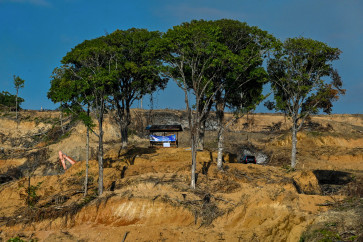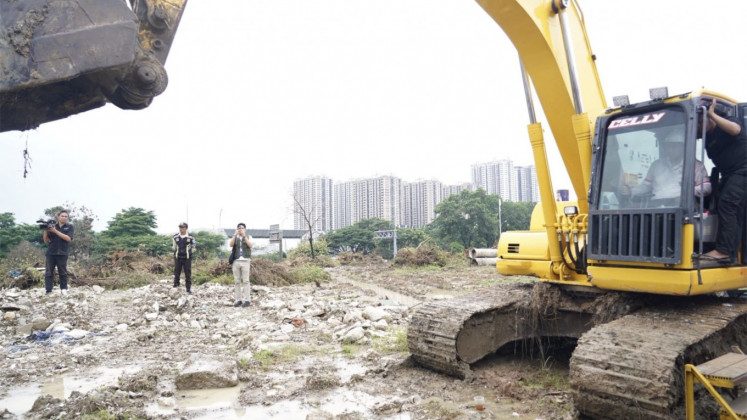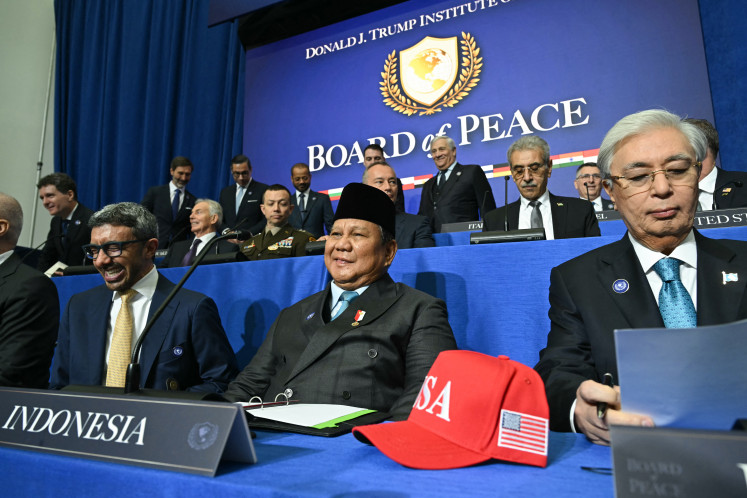Popular Reads
Top Results
Can't find what you're looking for?
View all search resultsPopular Reads
Top Results
Can't find what you're looking for?
View all search resultsCOVID-19 shrinks civic space in Southeast Asia
With the movement restrictions, civil society activities have become near impossible to carry out, except for through internet audio and video calls and via social media engagement.
Change text size
Gift Premium Articles
to Anyone
L
imitations on movement, on assembly, on public gatherings and on free speech have severely curtailed the operations of frontline civil society organizations. Funding for democracy and human rights issues has also been affected as donors halt disbursement of activity funds and channel resources towards combating COVID-19.
Restrictions on public gatherings puts civil society organizations (CSOs) at a major disadvantage. Their work to push back on authoritarianism and demand rights protection depends on being able to organize events, to engage in public advocacy, to meet with like-minded groups, to lobby public officials and to organize cross-border meetings.
With the movement restrictions, civil society activities have become near impossible to carry out, except for through internet audio and video calls and via social media engagement. Hence, coordination meetings, seminars and advocacy calls have been through the internet.
COVID-19 has effectively curtailed freedom of assembly.
In Indonesia, further protests and strikes across the country that were pledged by the unions in response to a new job bill fizzled out as COVID-19 infections and restrictions set in. Without no possibility for a public push back, the government is preparing to pass the Omnibus law that will relax labor regulations which may affect local jobs in Indonesia
In Malaysia, protests against the ‘back-door’ government appointed in March 2020, that were planned by elections watch NGO, Bersih were halted as the Movement Control Order was announced on 18 March 2020 now extended for the third time until May 12, 2020.
In Thailand, nation-wide youth protests on university campuses against the judicial harassment and consequent disbandment of the reformist opposition Future Forward Party was effectively silenced by the Emergency Decree of March 26, 2020. Additionally, a curfew from 10 pm to 4 am was announced on April 3 to last until April 30, 2020.
COVID-19 has impacted freedom of expression.
In late March 2020, the Acting Director of Cambodian human rights group LICADHO, was threatened over his criticisms of the government’s handling of the COVID-19 pandemic. Prime Minister Hun Sen threatened to have the activist arrested for being complicit in illegal acts in Cambodia.
In the Philippines, individuals can be jailed for spreading false information about COVID-19. President Duterte suggested in April 2020 police might shoot people who break quarantine terms. The next day an elderly man was shot, allegedly for complaining about lack of food and help and allegedly for threatening police.
The same is true in Myanmar, where, at the behest of Buddhist ultranationalists, several people were arrested for COVID-19 street art. Websites of news organizations were blocked as telecoms operator, Telnor, cited COVID-19 as a reason for doing so. Over 221, websites were blocked in March 2020.
In Vietnam, some 300 people have faced fines for posting Facebook comments on COVID-19. Meanwhile, the authorities slowed traffic to it for 7 weeks, from mid-February to early April 2020 until Facebook agreed to block access to anti-government content to users in Vietnam.
COVID-19 has affected funding for democracy and human rights.
Frontline civil society organizations that depend on grants and social enterprise activities to generate resources face serious financial constraints. Donors are re-purposing their grants or allocating their funds to technical, medical and clinical research entities that fight the COVID-19 directly.
Staff cuts are imminent as the funding dries up, which will negatively impact operations and capacity to
recover post-crisis. Existing projects are delayed and scheduled payments for ongoing projects have been halted. In addition, pledged funds are being withdrawn, delayed or repurposed.
Civil society organizations operating as self-funded social enterprises are having their income affected due to restrictions on business operations. In the meantime, overhead costs - rentals, communications costs, rentals, salaries and utilities - continue unabated.
COVID-19 has confined civil society to the online space.
Civil society’s online transition is no panacea for democracy and human rights advocacy as the health crisis is expected to last for some time. The movement restrictions add to the shrinking civic space in Southeast Asia. A phenomenon civil society has been experiencing in recent years as governments pass laws to control the registration, activities and funding of civil society organizations.
Fighting the COVID-19 pandemic requires a civil society that is able to pressure governments to observe democracy and human rights. A diminished civic space relegated to the online realm reduces the effectiveness of civil society’s contribution on this front.
Otherwise, the situation will evolve into one like Singapore, where activists who advocate within boundaries and avoid sanctions are the ones affirmed by the government. However, that’s not what activists who push back want.
Recapturing civic space, post-COVID-19, needs to be of deep concern.
***
James Gomez and Robin Ramcharan are directors of the Bangkok-based Asia Centre - a not-for-profit-organization that seeks to create social impact in the region. The Centre is presently investigating COVID-19’s impact on democracy and human rights in Southeast Asia.










